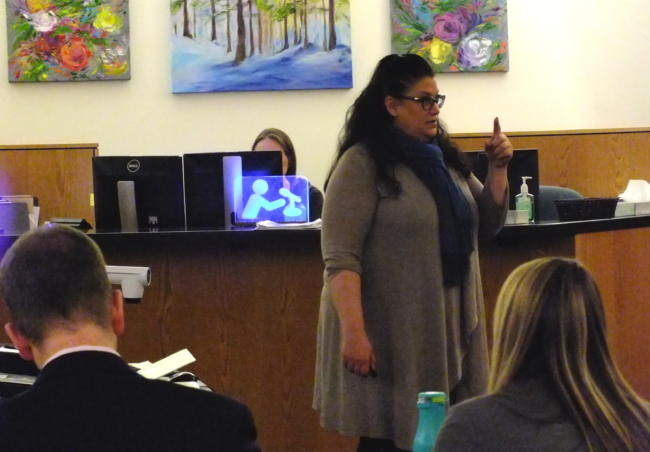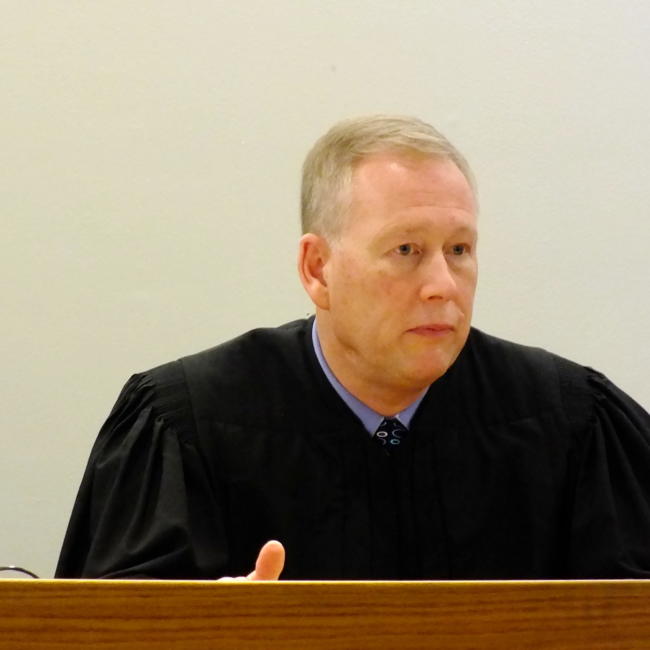
Content warning: This article includes mentions of sexual assault and abuse that may be uncomfortable for some readers. Resources are available at the bottom of this post.
Five more women have accused former Juneau-area chiropractor Jeffrey “Jeff” Fultz of abusing them under the guise of treating them for medical problems.
And while several of his accusers — and the state’s prosecutor — have again asked that he be returned to Juneau to post a higher bail and be monitored, a judge decided against it in early July.
Fultz worked for the Southeast Alaska Regional Health Consortium, or SEARHC, for seven years. He left after a Juneau woman told police in April that he sexually assaulted her.
Initially, he faced three charges of sexual assault, but when those charges became public, more women came forward. A total of 12 women are accusing him of abuse; he faces 17 charges of felony sexual assault and misdemeanor harassment.
Currently, Fultz is out on bail. A total of $45,000 in cash has been put up by him or on his behalf, according to case records. The court has ordered him to turn over his passport, avoid contact with SEARHC or any of the women accusing him of assault. He has also been ordered not to provide medical care – regardless of the status of his license.
But, several of the women who are accusing him of assault and the district attorney want the court to change those conditions.
The accusations
Each time Fultz has faced new charges, State Assistant District Attorney Jessalyn Gillum asks that the court reconsider its decision to allow him to live out of state, unmonitored.
“I believe this is our third time addressing bail regarding this case. Each time the circumstances have changed such that the state feels that readdressing the conditions of the defendant’s release is of paramount importance,” Gillum said during an early July arraignment.
She went on to describe accusations from women who said they were groped during sessions, including one woman who described being treated after-hours.
“When the entire office was emptied out and most of the office was actually dark. Where she was made to fully undress and the defendant then spent a significant portion of the session massaging her buttocks in a way that did not serve any legitimate chiropractic or massage therapeutic function,” Gillum said.
She noted the similarities between the details of some of the women’s accounts, saying that multiple women described discovering that Fultz was sexually excited during their sessions with him.
“All of these women describe being required to undress for these appointments to continue. The defendant never explained why disrobing was necessary. Some of these women have since gone to other treatment providers and now see the distinction and differences in the way they were treated and the way their bodies were handled to fully understand that what was done when seen by this defendant was in fact a violation and an assault rather than legitimate medical treatment,” Gillum said.

‘I think he should be here’
Gillum said the state is concerned that Fultz is still a threat to the communities he lives in and that the court should weigh the strength of the state’s case against him heavily when considering the conditions of his release.
“The concern that the state has is that the defendant has shown himself to be an individual that goes from Native community to Native community and seems to have a history of allegations such as this arise at multiple placements,” she said.
According to Indian Health Service records, before Fultz practiced in Juneau he primarily treated citizens of the Navajo Nation working in Arizona and New Mexico for at least 14 years including in:
- Four Corners Regional Health Center in Teec Nos Pos, Arizona from 2007-2013
- Northern Navajo Medical Center in Shiprock, New Mexico from 1999-2007
- Chinle, Arizona from 1991-1999
The court also heard similar arguments from a handful of the predominantly Alaska Native women who have accused Fultz of sexual misconduct. The court did not identify the women or ask them to identify themselves; it is KTOO policy not to name alleged victims of sexual crimes.

A woman referred to as C.E.L. told the court that it is incredibly difficult for her and other victims to come forward and speak. But she characterized Fultz as a “methodical predator” and said she doesn’t want other women to be victimized by him.
She asked that the court listen to what Fultz’s accusers say they want of him, instead of deciding what is best for them.
“The truth is that we will eventually have to face Mr. Fultz here in the court,” she said. “But I can honestly say that the discomfort of possibly running into him at the store or anywhere here in Juneau is nothing compared to the thought of him running free in another state without the supervision and monitoring that needs to be in place.”
Another woman cried as she told the court that she met Fultz after seeking treatment from SEARHC during her journey toward sobriety.
“I could have easily just went down that road again,” she said. “But, as of now I have two years of sobriety and I can’t — and I refuse to let him be any purpose for me to self-destruct anymore.”
She, too, said Fultz should have to be in-person in court in Juneau.
“You know I feel like I’m coming to court and putting all of this energy into these meetings and he’s able to just call on the phone and just be wherever he’s at and just let the court know, ok well I’m moving to this place now,” she said. “You know, this incident happened in Juneau and I think under the circumstances … I think he should be here and I think he should be monitored also.”
Fultz is not supposed to be practicing while the case is working its way through the court system. And he can’t legally practice in Alaska. In April, the state’s Director of the Division of Corporations, Business and Professional Licensing asked Alaska’s Board of Chiropractic Examiners to suspend his license to practice, arguing that he posed a “clear and immediate danger to the public health and safety.” Fultz then surrendered his Alaska license on May 17.
But Gillum said there is no way for the state to enforce the provision that he does not practice when he is living, unmonitored, outside of Alaska.

Pushing back
Neither Fultz nor his attorney, Natasha Norris, have responded to repeated requests for comment. But in court, Norris pushed back against the state’s request that Fultz’s bail be raised or that he be required to move back to Juneau.
She said it is important to remember that the charges are just accusations, that Fultz is presumed innocent and pointed out that he has cooperated fully with the state.
“As compelling or heartfelt as some of these statements are, these are allegations at this point,” she said.
She argued that he isn’t a flight risk because his passport is sitting in her office. And she said he has put up enough money for bail.
“My client has put up $40,000 of cash,” she said. “He is about tapped out financially. That is a lot of money to put down on the line. My client is not going to run, my client is facing these charges head-on.”
Norris told the court that Fultz is moving to Durango, Colorado to be closer to his daughter. She said he bought a house and gave an address that, according to Zillow, sold for more than $900,000 in June.

A presumption of innocence
Alaska Superior Court Judge Daniel Schally ultimately sided with Norris, He said he understands how challenging it is for the women to come forward and share their experiences publicly.
“Many such crimes are never reported, period. Whether to authorities, family members, the court… it is incredibly difficult to discuss those matters, and at least a couple of folks who spoke quite eloquently here in court today have spoken in court previously as well — and obviously have testified at a grand jury proceeding, and that takes a lot of courage, and I acknowledge that,” he said.
Though Schally said the nature of the charges Fultz is facing indicates some level of flight risk, he also noted that Fultz doesn’t have a criminal history. He joined Norris in saying the presumption of Fultz’s innocence applies.
And, as he has said before, Schally said he believes Fultz shouldn’t be in Juneau.
“While I understand it makes some people unhappy, I think it’s actually a very good thing on multiple levels,” Schally said. “Usually a geographical distance between the alleged victims of crime and alleged perpetrators of crime is a good thing, and given the number of folks involved in this matter, having Mr. Fultz elsewhere, I think is the best course.”

SEARHC responds
Fultz worked for SEARHC, but the consortium says he was a federal employee assigned to the facility by the U.S. Public Health Service Commission Corps — a type of uniformed health worker that follows quasi-military rules.
A spokesperson from SEARHC says the organization removed Fultz from the workplace and informed the public health service about the situation in 2020 after getting patient complaints
“This was before criminal charges were filed,” the spokesperson wrote.
He is the latest in a string of Indian Health Service medical providers who have been accused of abusing patients. It’s something the U.S. Department of Health & Human Services — the Indian Health Service’s parent agency — acknowledged late last year continues to be a challenge for the service to address.
As the case against him unfolds, a SEARHC spokesperson said the health consortium is taking steps to address the conditions that led up to the complaints against Fultz. In an email, the spokesperson wrote that consortium leadership has met to review policies with managers.
“Additional trainings were mandated for all employees to address sexual assault, harassment and offense behavior,” she wrote.
In early 2021, the Indian Health Services established a hotline for callers to report suspected child abuse or sexual abuse by calling 1-855-SAFE-IHS (855-723-3447) or submitting a complaint online IHS.gov website. The hotline may be used to report any type of suspected child abuse within the IHS, or any type of sexual abuse regardless of the age of the victim. The person reporting by phone or online may remain anonymous.
Locally, people can call AWARE in Juneau at 907-586-1090.
Fultz’s next hearing is Sept. 8.